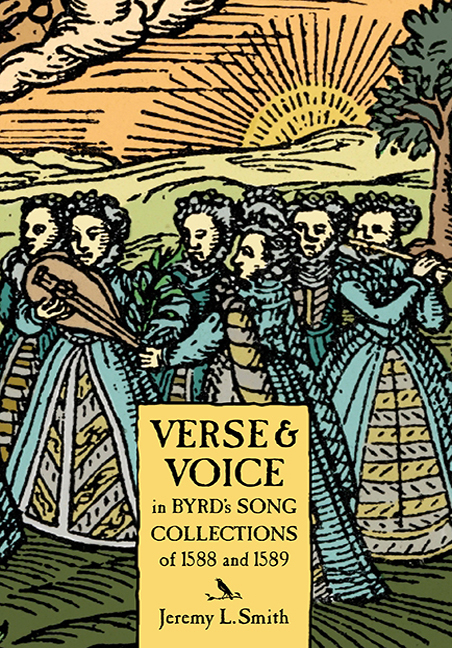Book contents
- Frontmatter
- Contents
- List of Figures
- List of Music Examples
- Preface and Acknowledgements
- Editorial Conventions
- Introduction
- CHAPTER 1 Psalmes
- CHAPTER 2 Sonets & Pastoralls, I
- CHAPTER 3 Sonets & Pastoralls, II
- CHAPTER 4 Sonets & Pastoralls, III
- CHAPTER 5 Songs of sadnes and pietie
- CHAPTER 6 Songs of Three Parts
- CHAPTER 7 Songs of Four Parts
- CHAPTER 8 Songs of Five Parts
- CHAPTER 9 Songs of Six Parts
- Conclusion
- Select Bibliography
- Index
- Studies in Medieval and Renaissance Music
CHAPTER 6 - Songs of Three Parts
Published online by Cambridge University Press: 05 July 2016
- Frontmatter
- Contents
- List of Figures
- List of Music Examples
- Preface and Acknowledgements
- Editorial Conventions
- Introduction
- CHAPTER 1 Psalmes
- CHAPTER 2 Sonets & Pastoralls, I
- CHAPTER 3 Sonets & Pastoralls, II
- CHAPTER 4 Sonets & Pastoralls, III
- CHAPTER 5 Songs of sadnes and pietie
- CHAPTER 6 Songs of Three Parts
- CHAPTER 7 Songs of Four Parts
- CHAPTER 8 Songs of Five Parts
- CHAPTER 9 Songs of Six Parts
- Conclusion
- Select Bibliography
- Index
- Studies in Medieval and Renaissance Music
Summary
IN the preface to his Songs of sundrie natures of 1589 Byrd celebrates the success of his Psalmes, Sonets, & songs of 1588 – its “good passage and utterance” (BE 13, p. xxxvii) – and offers this happy outcome as his rationale for publishing another set of music of a similar vein. In 1588 he could describe all the works therein as originally composed for a single voice and (four) instruments, although he makes sure to note that he has added texts to all the parts in the edition. As they were so consistent in their scoring and, to some extent, style, Byrd organized his songs of 1588 by their poetic topic, and seemingly in the most generic manner, fitting them into the categories of “psalmes, sonets [and pastoralls], and songs of sadnes and pietie.” Underneath it all is an organizational scheme based on a sequential method of story-telling that Byrd carried through the entire book. He makes no mention of that structural feature, however, in his preface, or elsewhere.
For his Songs Byrd lays things out quite differently. Following Netherlandish music publishing practices, this time he features three-, four-, five- and sixpart songs, which he groups together by part and presents in ascending order. Furthermore, rather than explain that some of them were originally of the 1 + 4, partly untexted, variety, but many had always been partsongs, he simply claims that they would “serve for all companies and voyces” (BE 13, p. xxxvii). As in 1588, he does not reveal any in-depth rationale for choosing the verses he sets and publishes. In keeping with the “sundrie” assertion of his title, he states only that the auditor will meet with works that range from the grave to the mirthful in mood (BE 13, p. xxxv). Variety itself he champions as the special merit of music in general and he strongly suggests it is the main feature of the 1589 set (BE 13, p. xxxvii).
Byrd does indeed provide much in the way of variety in this richly diverse collection.
- Type
- Chapter
- Information
- Verse and Voice in Byrd's Song Collections of 1588 and 1589 , pp. 134 - 165Publisher: Boydell & BrewerPrint publication year: 2016



